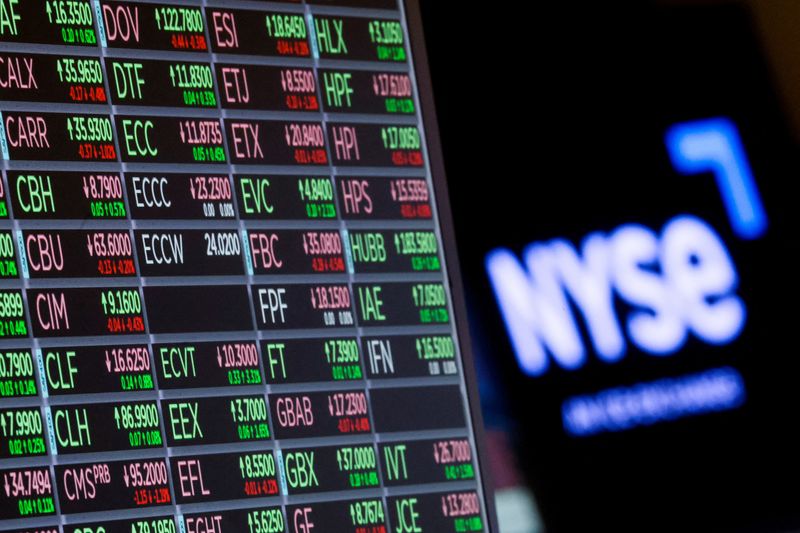Bitcoin price today: gains to $120k, near record high on U.S. regulatory cheer
By Geoffrey Smith
Invesitng.com -- Central bank meetings are set to dominate the week, with the Federal Reserve, European Central Bank, and Bank of England, all expected to raise their key rates by 50 basis points. Anticipation is keeping markets relatively quiet in the meantime. Amgen is the last man standing in a $26 billion auction for Horizon Therapeutics, while Microsoft is to take a stake in London Stock Exchange Group as part of a big deal to sell Azure services. China's COVID case load seems to be exploding, hitting local assets and oil prices. Here's what you need to know in financial markets on Monday, 12th December.
1. A new round of monetary tightening
The curtain goes up on a week set to be dominated by central bank meetings in the U.S. and Europe, which are likely to bring about another tightening of global financial conditions.
The U.S. Federal Reserve is expected to raise the target range for fed funds by 50 basis points to an upper limit of 4.50% on Wednesday, after four jumbo-sized steps of 75 basis points at each of its last four meetings. The European Central Bank is expected to follow suit on Thursday, along with Bank of England, and Swiss National Bank.
Any doubts about the BoE hiking this week were probably laid to rest earlier by data showing that the U.K. economy rebounded slightly more than expected in the month after Queen Elizabeth’s funeral, even though a recession over the next six months appears inevitable.
2. Amgen homes in on Horizon deal
Amgen (NASDAQ:AMGN) is homing in on a deal to buy Horizon Therapeutics (NASDAQ:HZNP), after French rival Sanofi (NASDAQ:SNY) said it would pull out of an auction for the drugmaker at the weekend, leaving Amgen as the only bidder left. Johnson & Johnson (NYSE:JNJ) had already withdrawn its interest.
The deal, valued at over $26B, would be Amgen’s biggest ever and could add as much as $4B a year to Amgen’s annual revenue, according to some estimates.
Horizon develops drugs for rare autoimmune and acute inflammatory diseases. Its biggest seller is Tepezza, which is used to treat thyroid eye disease. Amgen stock was down 3.1% in premarket trading on the news, while Horizon stock was up 14%.
3. Stocks set to edge higher; Rivian puts German deal on ice, while Microsoft hooks LSE
U.S. stock markets are otherwise expected to open moderately higher later, although volumes are expected to be moderate with many participants effectively sidelined ahead of the Federal Reserve meeting.
By 06:30 ET (11:30 GMT), Dow Jones futures were up 58 points or 0.2%, while S&P 500 futures were up 0.3%, and Nasdaq 100 futures were up 0.4%. The three main cash indices had lost between 1.4% and 2.1% last week on fears that the Fed will keep tightening for longer than previously thought, with the fed funds rate peaking at over 5%.
Other stocks likely to be in focus later include Microsoft (NASDAQ:MSFT), which is set to take a 4% stake in London Stock Exchange Group (LON:LSEG) in return for a big 10-year commitment to its Azure cloud hosting service. Azure head Scott Guthrie is expected to take a non-executive board seat as part of the deal.
Also in focus will be Rivian (NASDAQ:RIVN), which has suspended a project that would have seen it launch electric van making in Europe in partnership with Mercedes. Rivian stock was down 5% in premarket, while Mercedes (ETR:MBGn) was down 0.7% in Frankfurt.
4. China COVID stress increases
Chinese stock indices fell along with the yuan after authorities announced a steep rise in admissions to the country’s fever clinics.
The numbers, along with extensive anecdotal evidence of a health service under increasing pressure, indicate how fast COVID-19 has spread since restrictions on mobility were eased at the start of the month in response to widespread protests that vented their anger on the Communist Party and President Xi Jinping in person.
Beijing’s fever clinics received 22,000 people on Sunday, up 16-fold from a week earlier, according to the Global Times, an English-language CCP mouthpiece. Other media reports noted long lines of people outside of hospitals waiting for treatment, the disruption of delivery services due to couriers falling sick, and state media urging people not to call emergency medical hotline unless they are severely ill.
5. Oil down as China news weighs, Citi slashes forecast
Crude oil prices tested 13-month lows overnight in response to the COVID-19 news out of China, which is casting increasing doubt on the country’s growth outlook for the next six months. Citigroup analysts cut their average forecast for crude next year by 10% to $80 a barrel.
That overshadowed comments by Russian President Vladimir Putin, who warned that Russia may cut oil output in response to western moves to cap the price of the country’s exports. Initial developments, following the imposition of that cap, have left the bulk of Russian exports being heavily discounted as they struggle to find buyers willing to pay for high transportation charges.
By 06:45 ET, U.S. crude futures were down 0.8% at $70.43 a barrel, while Brent futures were down by a similar amount at $75.47 a barrel.
